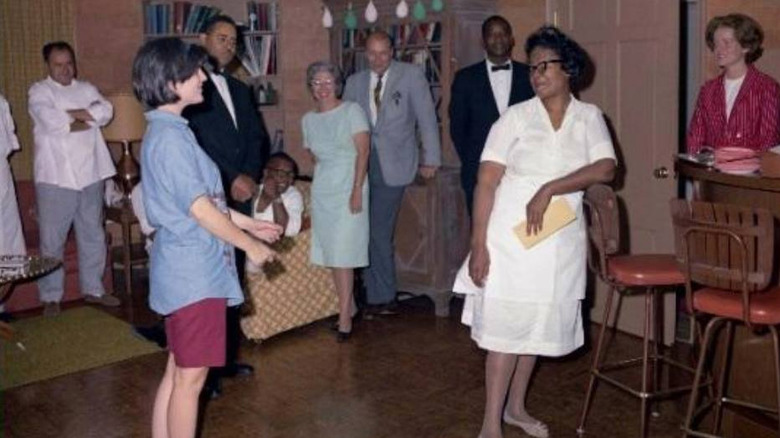How A White House Chef Influenced The Civil Rights Movement
Nearly everyone knows the names Martin Luther King, Jr., Rosa Parks, John Lewis, and Medgar Evers, but there are lesser-known freedom fighters associated with the Civil Rights Movement who maybe didn't get the news coverage and the historical recognition yet whose stories and actions still played a significant role in inspiring and instigating change. There is Bayard Rustin, the chief organizer of the March on Washington, who is credited with introducing King to the philosophy of nonviolent resistance. Rustin was also an early advocate of LGBTQ+ rights.
And Parks wasn't the only African American woman who defied the unjust laws of her day to protest their indignity. When she was only 15, Claudette Colvin refused to relinquish her bus seat to a white woman, nine months prior to the incident involving Parks, and later served as one of the plaintiffs in the court case Browder v. Gayle, which ultimately ruled Alabama's bus segregation laws unconstitutional.
Another unsung hero of the Civil Rights Movement is Zephyr Wright, an African American woman and Civil Rights activist born in Marshall, Texas, who worked as the personal chef for President Lyndon B. Johnson. Wright is believed to have helped influence Johnson's perspective on the 1964 Civil Rights Act and convinced him of the urgency of signing it into law after sharing some of her harrowing personal accounts of experiencing discrimination in the Jim Crow South.
Separate but unequal
As explained by The New York Times, for chef Zephyr Wright, there were no shortcuts in life. Wright initially began working for the Johnsons in the 1940s as a maid and cook and then went on to work for them up through 1969, which included Johnson's stint in the White House. She earned respect and renown among the Johnsons and their fellow political dinner guests as a result of her culinary prowess. Wright had a particular knack for comfort food creations such as chili con queso and peach cobbler, but her own station in life was far from comfortable.
She recalled some of the injustices and indignities she and her husband, Sammy, suffered during road trips with the Johnson family, including not being able to use the bathrooms, which were designated as "whites only" due to Jim Crow segregation laws, and not being allowed into restaurants. Eventually, these demeaning experiences caused Wright to stop traveling altogether and she remained in D.C. year-round, according to Adrian Miller, author of "The President's Kitchen Cabinet: The Story of the African Americans Who Have Fed Our First Families, from the Washingtons to the Obamas" (via Epicurious).
When arguing for the passage of the Civil Rights Act, Johnson would cite Wright's stories to members of Congress as a glaring firsthand example of why the legislation needed their support. Then, Wright was in attendance during Johnson's signing of the Civil Rights Act. He handed one of the pens he used to sign the bill to Wright, proclaiming, "You deserve this as much as anyone." Today, chefs continue to do good work in attempts to make positive change, including chef Mark Murphy helping Ukrainian refugees.

